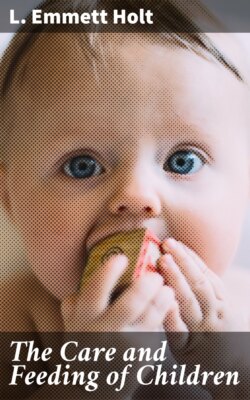Читать книгу The Care and Feeding of Children - L. Emmett Holt - Страница 13
На сайте Литреса книга снята с продажи.
AIRING
ОглавлениеHow early may airing indoors he commenced and how long may it be continued?
Airing in the room may be begun, even in cold weather, when the child is one month old, at first for only fifteen minutes at a time. This period may be gradually lengthened by ten or fifteen minutes each day until it is four or five hours. This airing may be continued in almost all kinds of weather.
Is there not great danger of a young baby's taking cold when aired in this manner?
Not if the period is at first short and the baby accustomed to it gradually. Instead of rendering the child liable to take cold, it is the best means of preventing colds.
How should such an airing be given?
The child should be dressed with bonnet and light coat as if for the street and placed in its crib or carriage which should stand a few feet from the window All the windows are then thrown wide open, but the doors closed to prevent draughts. Screens are unnecessary.
At what age may a child go out of doors?
In summer, when one week old; in spring and fall, usually at about one month; in winter, when about three months old, on pleasant days, being kept in, the sun and out of the wind.
What are the best hours for airing out of doors?
In summer and early autumn a child may be out almost any time between seven in the morning and sunset; in winter and early spring, a young child only between 10 or 11 A.m. and 3 P.m., although this depends somewhat upon the climate. In New York and along the Atlantic coast the early mornings are apt to be damp and the afternoons raw and cloudy.
On what kind of days should a baby not go out?
In sharp winds, when the ground is covered with melting snow, and when it is extremely cold. A child under four months old should not usually go out if the thermometer is below freezing point; nor one under eight months old if it is below 20° F.
What are the most important things to be attended to when the child is out in its carriage?
To see that the wind never blows in its face, that its feet are properly covered and warm, and that the sun is never allowed to shine directly into its eyes when the child is either asleep or awake.
Of what advantage to the child is going out?
Fresh air is required to renew and purify the blood, and this is just as necessary for health and growth as proper food.
What are the effects produced in infants by fresh air?
The appetite is improved, the digestion is better, the cheeks become red, and all signs of health are seen.
Is there any advantage in having a child take its airing during the first five or six months in the nurse's arms?
None whatever. A child can be made much more comfortable in a baby carriage, and can be equally well protected against exposure by blankets and the carriage umbrella.
What are the objections to an infant's sleeping out of doors?
There are no real objections. It is not true that infants take cold more easily when asleep than awake, while it is almost invariably the case that those who sleep out of doors are stronger children and less prone to take cold than others.
What can be done for children who take cold upon the slightest provocation?
They should be kept in cool rooms, especially when asleep They should not wear such heavy clothing that they are in a perspiration much of the time. Every morning the body, particularly the chest and back, should be sponged with cold water (50° to 60° F.).
How should this cold sponge bath be given?
The child should stand in a tub containing a little warm water, and a large bath sponge filled with cold water should be squeezed two or three times over the body. This should be followed by a vigorous rubbing with a towel until the skin is quite red. This may be used at three years, and often at two years. For infants a little higher temperature (65° to 70°) may be used.
